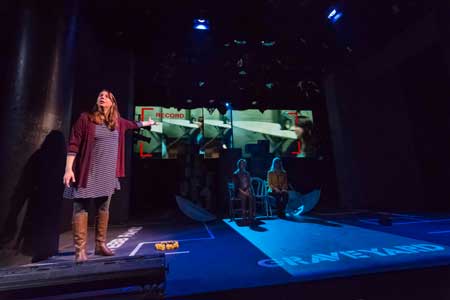Play (2018)
by Jennifer Barclay
Directed by Bridget Kathleen O’Leary
New Repertory Theatre
Boston Univeristy
855 Commonwealth Avenue, Boston
February 24 – March 11, 2018
With Reilly Anspaugh (Hadley/Bethany), Veronika Duerr (Zoe), Stacy Fischer (Miriam), Henry B. Gardner (Matt/Bryan James McNamara), Samantha Richert (Felicia)

in “Ripe Frenzy”
Photo: Kalman Zabarsky
Courtesy of New Repertory Theatre
Zoe (Veronika Duerr) is a graduate of, and parent of a son, at the high school in fictional upstate Tavistown, NY. The school is famously and ironically known for its record number of productions of Thornton Wilder’s Our Town. Zoe was in one of them when she was a student and her son is doing video support for the current production.
As she begins to describe the current production of Our Town overseen by Miriam (Stacy Fischer), drama teacher and friend of Zoe’s, she calls forth her long-standing relationship with Miriam and with Felicia (Samantha Richert), mothers of Hadley (Reilly Anspaugh) and Matt (Henry B. Gardner), also two students at the school, seeing one another and also involved in the show.
Coloring the pastoral recollections of warm high school scenes past and present is the horrific account of a school shooting in Michigan by a Bryan James McNamara (Henry B. Gardner). As the sense of terror prevails upon her reflections, the deeper and more immediate nature of Zoe’s story becomes painfully apparent. As the production of Our Town unfolds and her son’s relationship to the oddly antisocial Bethany (Reilly Anspaugh), another student, begins to surface, the immediacy of horror reveals itself.
This temporally fragmented play – the notes indicate that “time is slippery here” – moves between a recent past and a vivid present. It rapidly becomes apparent that for Zoe, the main character, whose part is a modulated soliloquy throughout, the events that unfold are cataclysms of memory, post-traumatic visions, woven into a fabric of attempted adaptation. As we see her in a relaxed camping outing with her two friends, with rehearsals for Our Town and in engagements with her (unseen) son, we get a sense of the normal, analogous to the “life” side of Our Town. We don’t really get what’s going on until well on towards the end when it gels together and the analogue to the “afterlife” side of Our Town becomes clear.
The story was apparently inspired by playwright Jennifer Barclay’s reading of Sue Klebold’s A Mother’s Reckoning: Living In The Aftermath of Tragedy (2016), the memoir of the mother of one of the gunmen at the Columbine school shooting. It offered a guide for Barclay to deal with the issue of school shootings by focusing on the drama of the mother’s turmoil.
In the talkback after the play, director Bridget Kathleen O’Leary indicated, in response to a question about why gun control did not figure significantly into the play, that its theme was more generally experiential and less polemical. Not attempting to explain the sources of violence or vehicles for controlling it, the play, at bottom, is a treatment of a kiiler’s mother’s grief and her incapacity to begin to understand how to deal with the commingling of guilt, rage and incomprehension that surround her.
In that sense, this play’s mission is quite specific. Zoe’s long wail of a role, a near monologue, conveys that mission eloquently. What motivates the killer has almost nothing to do with the plot, though hints that the Bryan James McNamara character gives about what motivates his actions are perhaps some of the most interesting moments of the play.
The infusion of Our Town as the template adds an intriguing factor by putting the sense of community, and life and death within it, at center stage. Though an interesting dramatic device, it at times seems a bit too convenient a metaphorical vehicle.
The agony of the protagonist, Zoe, is palpable; in its focus on expressing that, the play is effective. For reflections on the psychology of school shooters or on gun restrictions, one must look elsewhere.
– BADMan
Leave a Reply